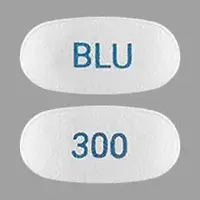Generic name: avapritinib
Drug class: Multikinase inhibitors
Dosage form: tablets
Availability: Prescription only
Pregnancy & Lactation: Risk data available
Brand names: Avapritinib
What is Ayvakit?
Ayvakit is a prescription medicine used to treat adults with certain types of gastrointestinal stromal tumor (GIST) and systemic mastocytosis (SM).
Ayvakit contains a drug called avapritinib, which belongs to the class of medicines called tyrosine kinase inhibitors.
GIST is a cancer of the gastrointestinal tract most often caused by mutations in the platelet-derived growth factor receptor alpha (PDGFRA) protein, which is part of a family of proteins called receptor tyrosine kinases (RTKs). Avapritinib works to treat GIST harboring a PDGFRA exon 18 mutation, including PDGFRA D842V mutations, by specifically targeting the mutant PDGFRA.
Systemic mastocytosis is a disorder characterized by the build up of mast cells in the body. It is most often caused by a D816V mutation in the KIT gene. Avapritinib works to treat advanced systemic mastocytosis (AdvSM) and indolent systemic mastocytosis (ISM) by specifically targeting KIT D816V.
What is Ayvakit used to treat?
Ayvakit is used to treat gastrointestinal stromal tumor (GIST) that cannot be treated with surgery or is metastatic (has spread to other parts of the body), and that is caused by certain abnormal platelet-derived growth factor receptor alpha (PDGFRA) genes.
Your healthcare provider will perform a test to make sure that you have this abnormal PDGFRA gene and to ensure that Ayvakit is right for you.
Ayvakit is used to treat advanced systemic mastocytosis (AdvSM), including aggressive systemic mastocytosis (ASM), systemic mastocytosis with an associated hematological neoplasm (SM-AHN), and mast cell leukemia (MCL).
Ayvakit is also used to treat indolent systemic mastocytosis (ISM).
It is not known if this medicine is safe and effective in children.
How should I take Ayvakit
Take Ayvakit exactly as your healthcare provider tells you to take it.
Do not change your dose or stop taking this medicine unless your healthcare provider tells you to.
Your healthcare provider may change your dose, temporarily stop, or permanently stop treatment with Ayvakit if you develop side effects.
Take Ayvakit tablets one time each day.
Take the tablet(s) on an empty stomach at least 1 hour before, and at least 2 hours after a meal.
If you miss a dose take it as soon as you remember unless your next scheduled dose is due within 8 hours. Take the next dose at your regular time.
If you vomit after taking a dose of Ayvakit, do not take an extra dose. Take your next dose at your next scheduled time.
Dosing information
Usual Adult Dose for Gastrointestinal Stromal Tumor (GIST):
300 mg orally once a day until disease progression or unacceptable toxicity.
Comments:
- select patients for treatment based on the presence of a PDGFRA exon 18 mutation.
Use:
- for the treatment of adults with unresectable or metastatic GIST harboring a platelet-derived growth factor receptor alpha (PDGFRA) exon 18 mutation, including PDGFRA D842V mutations.
Usual Adult Dose for Advanced Systemic Mastocytosis (AdvSM):
200 mg orally once a day until disease progression or unacceptable toxicity.
Use:
- for the treatment of adult patients with AdvSM. AdvSM includes patients with aggressive systemic mastocytosis (ASM), systemic mastocytosis with an associated hematological neoplasm (SMAHN), and mast cell leukemia (MCL).
Limitations of Use: not recommended for the treatment of patients with AdvSM with platelet counts of less than 50 X 109 /L
Usual Adult Dose for Indolent Systemic Mastocytosis (ISM):
25 mg orally once a day.
Use:
- for the treatment of adult patients with ISM.
Limitations of Use: not recommended for the treatment of patients with ISM with platelet counts of less than 50 X 109 /L
Before Taking
Before you start treatment, tell your healthcare provider about all of your medical conditions.
Pregnancy
Tell your healthcare provider if you are pregnant or plan to become pregnant. Ayvakit can cause harm to your unborn baby.
Females who are able to become pregnant:
- Your healthcare provider should do a pregnancy test before you start treatment.
- You should use effective birth control (contraception) during treatment, and for 6 weeks after the final dose. Talk to your healthcare provider about birth control methods that may be right for you.
- Tell your healthcare provider right away if you become pregnant or think you may be pregnant during treatment.
Males with female partners who are able to become pregnant should use effective birth control (contraception) during treatment, and for 6 weeks after the final dose.
Breastfeeding
Tell your healthcare provider if you are breastfeeding or plan to breastfeed. It is not known if this medicine passes into your breast milk. Do not breastfeed during treatment, and for at least 2 weeks after the final dose. Talk to your healthcare provider about the best way to feed your baby during this time.
What should I avoid while using Ayvakit?
Do not drive or operate heavy machinery if you have confusion or trouble thinking during treatment.
Ayvakit side effects
Ayvakit may cause serious side effects, including:
Bleeding in your brain. Serious bleeding in the brain may happen during treatment with Ayvakit and may lead to death. Stop treatment and tell your healthcare provider right away if you develop any symptoms such as severe headache, vomiting, drowsiness, dizziness, confusion, or severe weakness on one or more side of your body. If you have AdvSM, your healthcare provider will check your platelet counts before and during treatment with this medicine.
Bleeding in the brain has not been seen in people treated with Ayvakit for ISM.
Cognitive effects. Cognitive side effects are common and can be severe. Tell your healthcare provider if you develop any new or worsening cognitive symptoms including:
- forgetfulness
- confusion
- getting lost
- trouble thinking
- drowsiness
- trouble staying awake (somnolence)
- word finding problems
- seeing objects or hearing things that are not there (hallucinations)
- change in mood or behavior
Skin sensitivity to sunlight (photosensitivity).
The most common side effects in people with GIST include:
- fluid retention or swelling
- nausea
- tiredness or weakness
- trouble thinking
- vomiting
- decreased appetite
- diarrhea
- increased eye tearing
- stomach area (abdominal) pain
- constipation
- rash
- dizziness
- hair color changes
- changes in certain blood tests
The most common side effects in people with AdvSM include:
- fluid retention or swelling
- diarrhea
- nausea
- tiredness or weakness
- changes in certain blood tests
The most common side effects in people with ISM include:
- swelling around your eyes
- dizziness
- swelling of your arms and legs
- flushing
Your healthcare provider may change your dose, temporarily stop, or permanently stop treatment if you develop certain side effects.
Ayvakit may cause fertility problems in females and may decrease sperm production in males, which may affect your ability to have a child. Talk to your healthcare provider if this is a concern for you.
These are not all of the possible side effects.
Call your doctor for medical advice about side effects. You may report side effects to FDA at 1-800-FDA-1088.
See more: Ayvakit Side Effects





